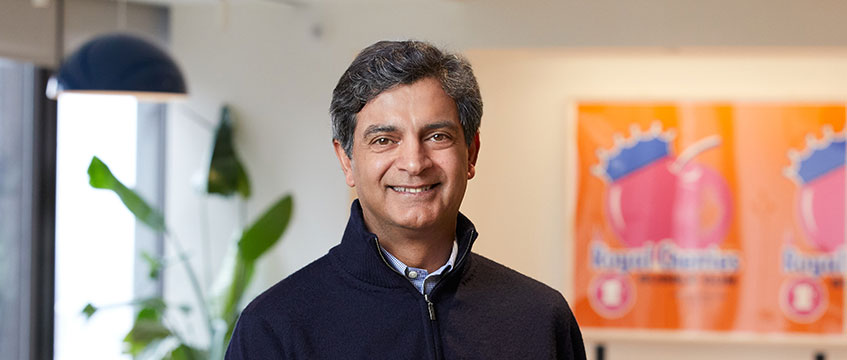WeWork has hired a real estate pro as its new chief executive. But does the former Brookfield executive have what it takes to turn around the loss-making group?
WeWork’s new chief executive, Sandeep Mathrani, already has an illustrious real estate career behind him. His property credentials are now expected to help steer WeWork forward after co-founder Adam Neumann’s growth-at-all-costs approach brought the firm to the brink of financial collapse last year.
The former Brookfield Properties retail chief executive replaces Artie Minson and Sebastian Gunningham, the co-chief executives who took over from Neumann in September.
In a statement, Mathrani said WeWork had “redefined how people and companies approach work with an innovative platform, exceptionally talented team and significant potential if we stick to our shared values and maintain our members-first focus”.
So who is the man tasked with leading the troubled co-working company into its next era?
He went to Eton… for a bit
The Indian-American briefly went to UK public boarding school Eton, but quickly left. “I hated it,” Mathrani said during an acceptance speech for a real estate industry award last year. “My dad said, ‘You’re supposed to go to Eton and then to Oxford,’ but I decided to go to America.”
Mathrani travelled to Pennsylvania to attend public high school as an exchange student. He went on to earn engineering and business degrees from Stevens Institute of Technology.
He is a real estate veteran
As a young engineer earning $25,000 a year, Mathrani turned a profit by selling his apartment. He sold his car to afford a deposit for a $55,000 flat, which he sold two years later for $75,000. He recounted during the award speech: “I made 20 grand – hallelujah. Real estate is a good business!”
He was later hired as a shopping mall designer before joining development company Forest City Ratner in 1994, where he rose up the ranks to become executive vice president by the age of 28. As VP he was responsible for retail development and leasing in New York.
In 2010, he became chief executive officer at General Growth Properties, one of the largest shopping mall operators in the US, which was acquired by Brookfield in 2018.
This is not his first corporate turnaround job…
Mathrani became chief of General Growth Properties as it was coming out of what was then the biggest real estate bankruptcy in US history. On a roadshow to take the mall operator out of bankruptcy, he raised $2.3bn. He also recapitalised the company with an additional $6.8bn in equity.
Several years later, Mathrani led the sale of the firm to Brookfield Property Partners in a $15bn deal. Under Mathrani’s leadership, GGP had cut its portfolio to focus on its prime properties – including Water Tower Place on North Michigan Avenue in Chicago and Oakbrook Center in the city’s suburbs.
Mathrani now faces a tough target to make WeWork cash generative by 2021. As Gareth Evans, chief executive of UK workspace firm BizSpace, comments: “That is a big ask. It will involve a fairly wholesale restructuring as WeWork has massive rental liabilities. It might need to give leases back, which will impact some landlords. It also potentially precludes growth, as you need cash to grow.”
…But he faces a fresh set of challenges
The problems at WeWork are unique, with the firm still reeling after a painful failed listing process. WeWork had boasted a $47bn (£36bn) valuation, but was hit by a scuppered IPO that led to co-founder Neumann’s resignation.
Plans to take the company public fell apart under scrutiny from Wall Street. Japanese fund SoftBank, the US start-up’s biggest investor, took a $4.6bn hit and was forced to inject $9.5bn, causing WeWork’s valuation to plummet to $8bn.
The IPO also revealed many of the firm’s vulnerabilities. It highlighted WeWork’s huge losses and underlined the fact that the company was heavily reliant on Neumann. On the publication of the prospectus, the property industry was stunned to learn about governance issues, including the WeWork chief executive’s lack of a contract.
Mathrani’s appointment suggests that WeWork is looking for someone to focus more on the bottom line than a vague strategy to build a sprawling mass of companies to, as Neumann once put it, “elevate the world’s consciousness”.
Will Kinnear, co-director at flexible workspace specialist GKRE, tells EG: “To have someone come in who was previously a real estate chief executive speaks volumes. It takes away from the idea of branding WeWork’s parent, We Company as a tech business. The firm was going to be data driven from every aspect of life – the We Company would know everything about you, how you work, where you work.
“If businesses such as Knotel, WeWork and others, which are currently unprofitable can become profitable, this could lead to external investors and property owners viewing the sector differently and open the door to parties that have previously dismissed the flexible workspace market as a bubble.”
At Brookfield he backed WeWork rival Industrious
While Mathrani has largely operated in the retail sector, co-working is not new to him. While at Brookfield he oversaw the firm’s funding of WeWork rival Industrious, which raised $80m last year. Brookfield Properties Retail backed the business alongside luxury fitness chain Equinox.
Unlike WeWork, Industrious’s strategy avoids signing long-term leases and partners with landlords to manage their buildings. At the time, Mathrani said that as Brookfield’s properties morph into hubs where people shop, dine, live and work, “co-working space is a growing area in our portfolio”.
To send feedback, e-mail anna.ward@egi.co.uk or tweet @annaroxelana or @estatesgazette











